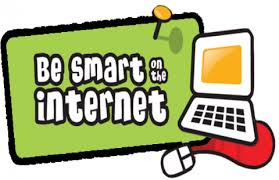
POLICIES FOR STAYING SAFE
~Do not open spam mail.
A lot of times we will receive email from people or companies that we do not know.
These will most always be spam. These types of emails could contain viruses or other encrypting information.
~Do not open unknown attachments.
Unknown attachments can have a virus and the sender may not even have known. Any attachments from
spam mail or unknown senders, you should definitely not open. There is always the potential for risk.
~Do not share your passwords with anyone.
Sharing passwords is a bad idea. If other people have access to your information, it could fall into the
wrong hands. Someone could take your password and change, add or delete your personal information on other sites.
~Keep all your passwords in a secure place.
By always keeping your passwords secure, you are protecting the most valuable thing you have, yourself.
Keep them in a safe place, locked if possible from anyone that could get to them.
~ Change your passwords regularly.
By changing your passwords on a regular basis, scammers and others that
try to have access to your information have a much harder time. Be sure to keep that information written
down in a secure place when the passwords have been changed.
HERE ARE 10 KID FRIENDLY RULES FOR ONLINE SAFETY
1. I will not give out personal information such as my address or telephone number.
2. I will tell my parents right away if I come across something that makes me feel uncomfortable.
3. I will never agree to get together with someone I “meet” online.
4. I will talk with my parents about posting pictures of myself or others online.
5. I will not respond to any messages that are mean or in any way make me feel uncomfortable. It is not my fault if I get a message like that. If I do I will tell my parents right away.
6. I will talk with my parents so that we can set up rules for going online and using a mobile phone. We will decide upon the time of day that I can be online, the length of time I can be online and appropriate areas for me to visit. I will not access other areas or break these rules without their permission.
7. I will not give out my passwords to anyone (even my best friends) other than my parents.
8. I will check with my parents before downloading or installing software.
9. I will be a good online citizen and not do anything that hurts other people or is against the law.
10. I will help my parents understand how to have fun and learn things online and teach them things about the Internet, computers and other technology.
Check out the Brainpop video below explaining online rules. This would be great to add to your classroom!
REFERENCES
- (2012, July 16). Wild About Safety with Timon and Pumbaa: Safety Smart Online. Retrieved from https://www.youtube.com/watch?v=M-njh8mFvVk
- (2018). Kids' Rules for Online Satey. Retrieved from http://www.safekids.com/kids-rules-for-online-safety/
- (2016, September 13). BrainPop UK Online Safety. Retrieved From https://www.youtube.com/watch?v=lGINGcaYZaA